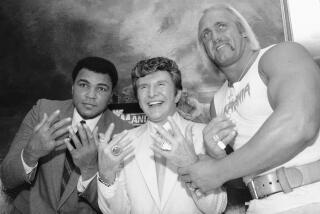Selling the Greatest
- Share via
THE NOTION THAT MUHAMMAD ALI is a sellout is about as close to heresy as you can get in American culture. But last week, the former three-time heavyweight champion of the world sold the commercial rights to his name and likeness. That means the man who sacrificed his title for his principles could soon appear on a carton of “Thrilla in Vanilla” ice cream or in an ad for “Float Like a Butterfly” air mattresses. Which raises a question: Does this deal represent the Greatest of All Time’s final victory, or his last defeat?
One answer is to note that Ali, 64, has already trademarked the phrase “Greatest of All Time” for use on apparel and accessories, and he earns about $7 million annually from licensing deals. So last week’s deal with CKX isn’t exactly groundbreaking. A licensing firm based in New York that owns the rights to a smattering of entertainment properties and celebrated names (most notably Elvis Presley’s), CKX bought an 80% interest in Ali’s name, image and trademarks for $50 million. Ali can force the firm to buy the remaining share of the rights in five years.
Another response is to ask: Only $50 million? After all, CKX paid twice as much for the rights to Presley’s name and properties, and three times as much for control of the company that helped create “American Idol” and manage the Spice Girls.
There’s no telling what becomes a legendary name most, however, and wringing dollars out of Ali’s iconic image and famous name won’t be as straightforward as selling tickets to Graceland or yet another expansion of the “Idol” franchise (“Belarusian Idol,” anyone?). True, Ali was a phenomenal pitchman during his ring days, blessed with a tongue even faster than his fists and feet. But unlike George Foreman, the former heavyweight champ who made a fortune promoting indoor grills and car mufflers, Ali focused on only one product: himself. And since his retirement, he has rarely traded on his fame to sell other people’s goods. Instead, he has spent most of his time supporting humanitarian causes, particularly in Asia and Africa, even as Parkinson’s syndrome has slowed him.
More important, Ali transcended his sport as few athletes have. His silhouette conjures up echoes not just of his boasting rhymes but of his unapologetic stances on religion and politics. Shortly after winning his first title, he announced that he had joined the Nation of Islam and was changing his name from Cassius Clay to Cassius X -- later to become Muhammad Ali. And citing his religion, he refused to serve in the Army after being drafted. His opposition to the Vietnam War cost him the heavyweight title and more than two prime years in the ring, in addition to drawing a five-year prison term (the Supreme Court eventually threw out his conviction for draft evasion). But it also solidified his reputation as an athlete who was fighting for more than just a paycheck.
That’s why Muhammad Ali may be one of the few people in America that could have pulled off this deal -- and why, in the end, it’s more of a win than a loss for him: His brand is more powerful than even the most comprehensive marketing campaign. If a product misuses Ali’s name or likeness, it is the product that will suffer, not Ali. To paraphrase one of Ali’s signature taunts, if CKX even dreams of beating up his image, it had better wake up and apologize.
More to Read
Go beyond the scoreboard
Get the latest on L.A.'s teams in the daily Sports Report newsletter.
You may occasionally receive promotional content from the Los Angeles Times.










